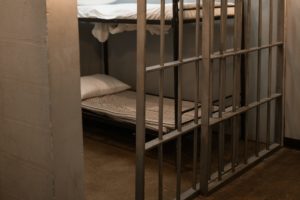School to Prison Pipeline
By Lindsay B. – Research Intern
What is the School-to-Prison Pipeline?
 The school to prison pipeline is a term used to describe the trend in which students begin school but eventually end up in juvenile and criminal justice systems. The relationship between education and the court systems has led to disciplinary policies that often promote the criminalization of young students. When an education system employs harsh punishments for minor violations, this violent cycle is created. Students are repeatedly over-punished by methods that do not effectively reform their behavior (e.g., in-school suspension, out-of-school suspension); this leads to repeat offenses, which can then lead them to a criminal offense.
The school to prison pipeline is a term used to describe the trend in which students begin school but eventually end up in juvenile and criminal justice systems. The relationship between education and the court systems has led to disciplinary policies that often promote the criminalization of young students. When an education system employs harsh punishments for minor violations, this violent cycle is created. Students are repeatedly over-punished by methods that do not effectively reform their behavior (e.g., in-school suspension, out-of-school suspension); this leads to repeat offenses, which can then lead them to a criminal offense.
How is this process created?

There are numerous aspects that contribute to this process. As an example, let’s consider suspension. When a student is suspended, they are not receiving an education, they are missing in-class work that cannot be made up, and often times they are unsupervised without direction. This process is seen most often in educational institutions with zero-tolerance policies. With zero-tolerance policies, minor offenses that can be resolved at school, lead to harsh punishments such as suspension, expulsion, or even “in-school” arrests. The ACLU¹ explains how students are now being suspended and expelled at higher rates than ever before, and the employment of inexperienced school-resource officers had led to a dramatic increase in “in-school” arrests. While suspension, expulsion, and “in-school” arrests are considered to be “reformative”, they are actually more likely to lead to further disengagement and recklessness of the student. This is because these students often develop a negative view of school, authority, and structure. Many individuals involved in public education actually describe observing a point in which the student would rather be suspended than be at school. At such an impressionable age, these developing, maladaptive behaviors can have large repercussions if not addressed properly.
Zero-tolerance policies, which lead to a disproportionate number of suspensions, expulsions, and “in-school” arrests, end up making it more likely that a student will end up in a juvenile detention center, jail, or prison. In her article², Nicki Lisa Cole, Ph.D., discusses data that suggests that once a student is expelled or suspended, they are more likely to drop out of high school, and more than twice as likely to be arrested while suspended or expelled.
Why is the School-to-Prison Pipeline a Problem?
There are obvious reasons as to why this is a problem, along with many covert reasons. Firstly, when students are left unsupervised and without structure, they are more likely to act out. Zero-tolerance policies promote the use of harsh punishment over redirection and reform, which is simply not effective.
 More concerningly, the school-to-prison pipeline is observed primarily in disadvantaged communities and in schools that lack resources and funding. In many underfunded school districts, school-resource officers are employed in an attempt to maintain control, due to a lack of other resources such as ample staff and mental health counselors. The employment of school-resource officers has contributed largely to the school-to-prison pipeline, especially in regards to students of color, disabled students, and LGBTQ+ students. For example, the National Education Association³ explains that Black and Latino students are suspended far more often than white students; this is not because these students are inherently worse behaved, but rather that they are monitored and targeted due to racial biases.
More concerningly, the school-to-prison pipeline is observed primarily in disadvantaged communities and in schools that lack resources and funding. In many underfunded school districts, school-resource officers are employed in an attempt to maintain control, due to a lack of other resources such as ample staff and mental health counselors. The employment of school-resource officers has contributed largely to the school-to-prison pipeline, especially in regards to students of color, disabled students, and LGBTQ+ students. For example, the National Education Association³ explains that Black and Latino students are suspended far more often than white students; this is not because these students are inherently worse behaved, but rather that they are monitored and targeted due to racial biases.
Court involvement, juvenile detention, and alternative schools serve to provide an easy fix for the school, but not the student. It is more important to help students learn from their mistakes than to punish them. In an attempt to break this school-to-prison cycle, restorative practices are now being employed to help address the root of disciplinary offenses, as opposed to harsh punishment.
¹https://www.aclu.org/issues/juvenile-justice/school-prison-pipeline
²https://www.thoughtco.com/school-to-prison-pipeline-4136170
³https://www.nea.org/advocating-for-change/new-from-nea/school-prison-pipeline-time-shut-it-down